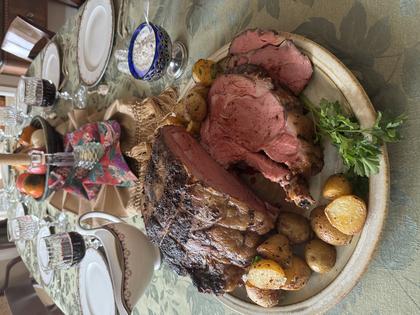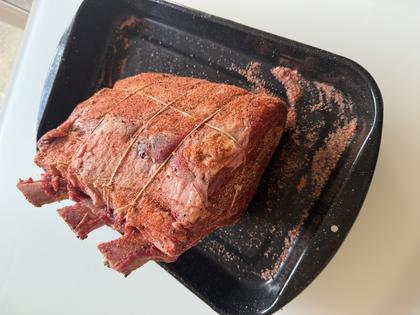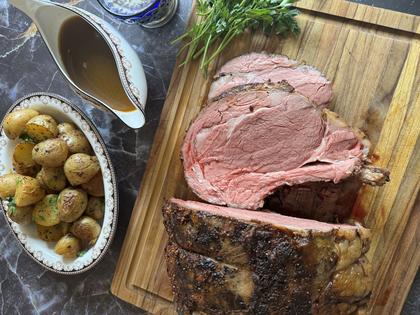A spectacular holiday dinner awaits
A standing rib roast, also known as prime rib, makes a spectacular holiday dinner. Cooked perfectly, the presentation certainly impresses. This fantastic cut of beef is tender, flavorful and relatively easy to carve. Holiday fare, for sure.
A whole beef rib roast has seven ribs, weighs 16 to 20 pounds and easily serves 15 hearty eaters. Some club stores stock the whole roast during the holiday season. Three to five rib roasts, weighing 8 to 12 pounds, prove more readily available and more manageable for most cooks.
A three-rib roast suits our holiday needs perfectly. I prefer a first-end cut because it’s slightly leaner than the large-end roasts. I ask the local butcher to separate the bones from the eye of the roast, then tie it all back together so the meat roasts on its bones. This makes the roast a dream to carve. I also like to “French” the ends of the bones, that is to remove the meat around an inch or so of each rib bone for a pretty presentation. Save these trimmings for making the au jus that follows.
This luxury cut comes with a luxury price. All the more reason to make a cooking plan for the roast and the rest of the meal. I set the ideal dinner time, then calculate the roast’s cooking time to determine preheating the oven.
For the past holidays, I start the roast in a very hot oven (450 degrees) for 20 minutes and then reduce the oven to 300 to finish the cooking — usually another two hours. This method results in a nice browned exterior with a large pink medium-rare center, but some gray edges. It also causes the roast to shrink a bit.
This year, I’m changing it up. Enter the slow-roasting method — perfect for a family that enjoys rare to medium-rare beef. This method cooks the beef more evenly with terrific residual juiciness. Always a good thing.
This method mimics the reverse sear method ideal for a thick steak or tomahawk cut on the grill: Sear the meat to give it a browned appearance and flavor, then finish the cooking indirectly over very low heat. A rib roast is a bit more cumbersome to sear, but not at all impossible. Employ a large cast-iron skillet or griddle set on the stovetop. Then brown the roast on the hot surface, using oven mitts and tongs to turn it to brown all the sides. Then put it into a roasting pan and slip it into a warm (not hot) oven to slowly cook the interior.
Cooking time for a three-rib, 8-pound roast is four to five hours. I use an auxiliary oven thermometer to be sure my oven stays at a steady 200 degrees. Start checking the meat’s internal temperature at the four-hour mark. Know that once you have the preferred temperature, you can turn off the oven and hold the roast about 30 minutes without overcooking or losing too much heat.
I use a large roasting pan so I can surround the beef with small potatoes to cook alongside it. This ultra-slow-roasting of the potatoes renders their interior super creamy. A brief time in a very hot oven adds crisp edges.
The homemade au jus is a great way to rewarm beef slices that may have cooled off. Simply pour a couple of tablespoons of very hot au jus over the beef.
Serve the beef with the potatoes, au jus and a zesty horseradish cream sauce. Since the oven is occupied, I cook broccoli or asparagus spears on the stovetop to serve alongside. Start the festive dinner with a salad of radicchio, romaine, sliced pears, crumbled blue cheese and toasted walnuts. Let the wine flow and embrace those around the holiday table.
Slow-Roasted Beef Rib Roast with Potatoes
Makes 8 servings
About 1/4 cup roast beef seasoning rub, see recipe
3-bone prime rib roast, about 9 pounds, bones Frenched if desired, tied into a compact roast
3 tablespoons safflower oil or expeller pressed canola oil
24 small yellow potatoes (about 3 pounds), scrubbed clean
Red wine au jus, see recipe
Horseradish cream with whole grain mustard and herbs, see recipe
Chopped fresh herbs, such as parsley and chives, for garnish
1. Make seasoning rub.
2. Rub seasoning mixture all over the roast, on the ribs and into any nooks and crannies. Put roast on a plate and cover loosely. Refrigerate for at least 2 hours or up to two days.
3. Preheat the oven to 200 degrees. Meanwhile, turn on the exhaust fan. Heat a large cast-iron skillet or griddle over medium-high heat until hot enough to make a drop of water sizzle on contact. Add 1 tablespoon of the oil, then add roast, fat side down. Cook, turning roast every 5 minutes, until nicely browned on all sides.
4. Transfer the roast, bone-side down, to a large shallow roasting pan. Arrange potatoes around roast and drizzle potatoes with remaining 2 tablespoons oil. Turn the potatoes to coat them with the oil.
5. Put the roast into the 200-degree oven on the middle rack. Cook, rotating pan occasionally until an instant-read thermometer, inserted into the thickest portion of the meat away from bone and fat, registers 120 degrees for rare or 125 degrees for medium-rare, 4 to 5 hours. Begin checking the temperature after 4 hours. Keep in mind that the internal temperature of the meat will rise 5 to 10 degrees while it rests, so remove it from the oven a few degrees before it reaches the desired temperature.
6. Make the red wine au jus and the horseradish cream while the beef cooks.
7. Transfer roast, bone side down, to a cutting board and cover loosely with foil. Let rest about 20 minutes.
8. Meanwhile, increase oven temperature to 400 degrees. Cut the potatoes in the roasting pan in half. Stir well to coat them with the pan drippings from the beef. Roast at 400 degrees until golden, about 15 minutes. Transfer to a serving bowl. Sprinkle with herbs.
9. To carve the roast, remove the twine. Slice the meat down towards the bones into thin slices. Cut between the rib bones to separate them. Arrange the beef slices and the rib bones on a warmed platter. Pass the red wine au jus and the horseradish cream for guests to add as they wish.
Roast Beef Seasoning Rub
Makes about 1/2 cup
1/4 cup coarse (kosher) salt, such as Diamond Crystal
2 tablespoons red espelette pepper or sweet paprika
1 tablespoon garlic powder
1 1/2 teaspoons freshly ground black pepper or mixed peppercorns
1 teaspoon smoked paprika, optional
1. Mix all ingredients in a small bowl or jar with a tight-fitting lid. You’ll use about half the spice mixture for a 9-pound roast.
Red Wine Au Jus
Makes about 1 cup
4 ounces diced beef scraps from roast bone trimmings or beef chuck with fat
1 tablespoon olive oil
2 shallots or green onions, finely chopped
2 cloves garlic, finely chopped
1/2 cup dry red wine or marsala
2 cups low-sodium beef or chicken broth
Salt, freshly ground black pepper to taste
1. Brown beef scraps in oil in a small saucepan over medium heat, about 10 minutes. Stir in shallots and cook 2 minutes Stir in garlic and wine.
2. Boil while scraping up browned bits from pan until wine has reduced by half. Add broth and simmer over very low heat, stirring often, about 30 minutes.
3. Strain. Taste and adjust seasoning with salt and pepper. Serve hot.
Horseradish Cream with Whole-Grain Mustard and Herbs
Makes about 1 1/2 cups
1 cup sour cream or plain yogurt or a combination
2 to 3 tablespoons prepared horseradish, to taste
2 tablespoons whole-grain mustard
1/4 teaspoon salt
1/4 cup chopped fresh herbs, such as chives, parsley, cilantro or a combination
1. Mix everything in a small bowl. Refrigerate covered about 1 hour or up to two days. Serve at room temperature.
(JeanMarie Brownson is a James Beard Award-winning author and the recipient of the IACP Cookbook Award for her latest cookbook, “Dinner at Home.” JeanMarie, a chef and authority on home cooking, Mexican cooking and specialty food, is one of the founding partners of Frontera Foods. She co-authored three cookbooks with chef Rick Bayless, including “Mexico: One Plate at a Time.” JeanMarie has enjoyed developing recipes and writing about food, travel and dining for more than four decades.)
©2024 JeanMarie Brownson. Distributed by Tribune Content Agency, LLC.
















Comments